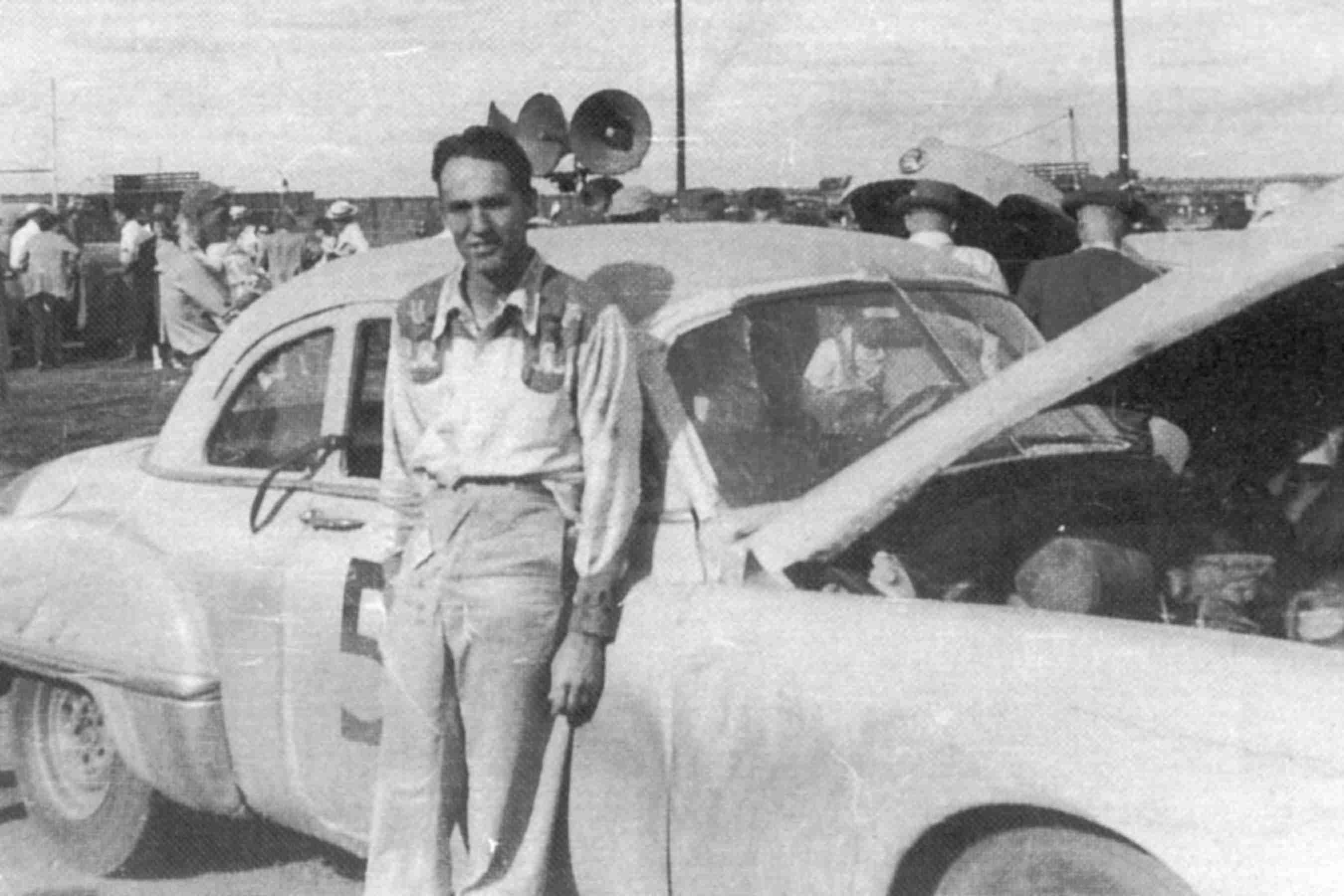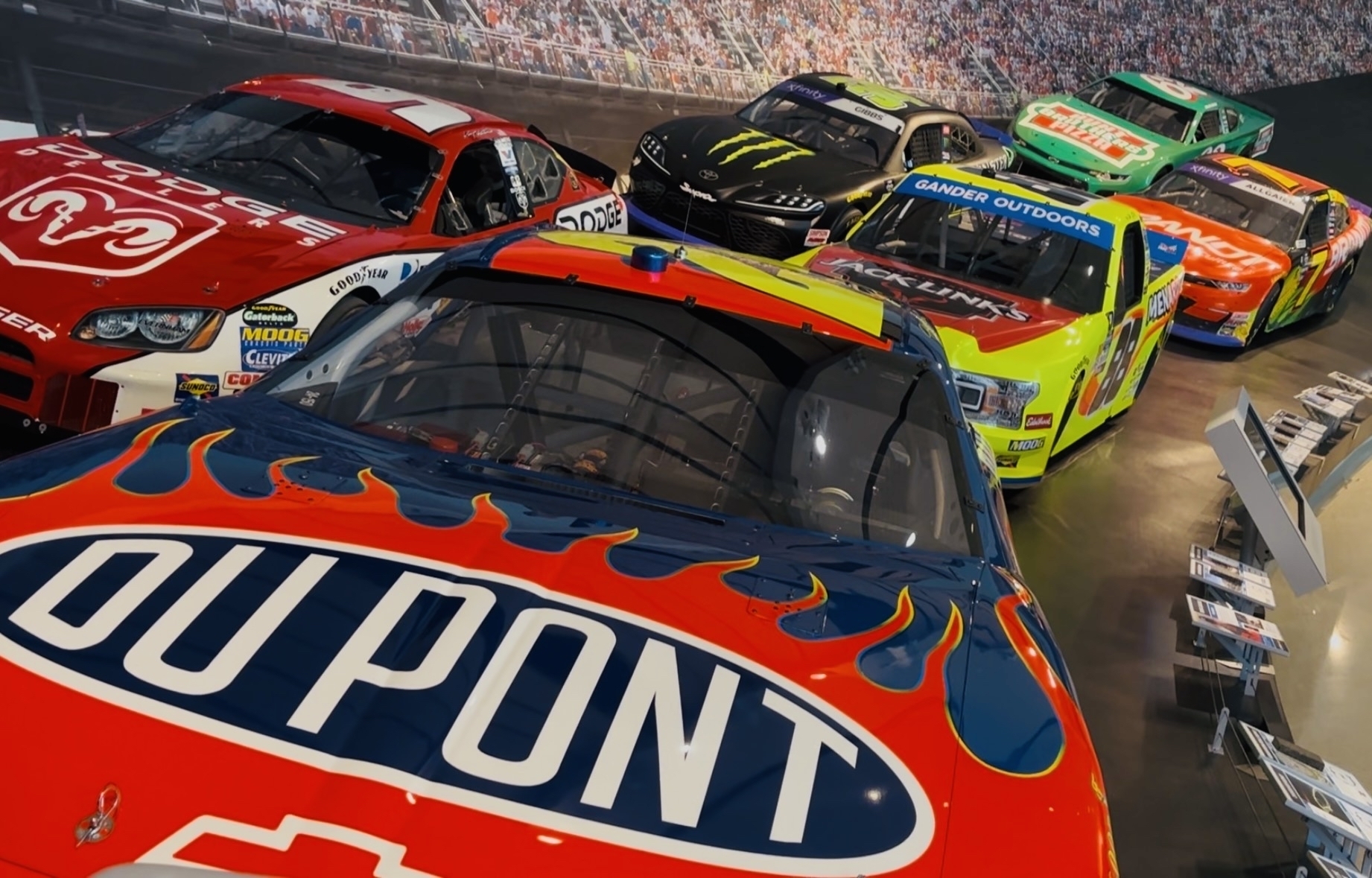Kansas’ NASCAR Connections
by Tom Jensen May 05, 2023
NASCAR races in Kansas twice a year, but NASCAR racers from Kansas are a rare breed indeed.
NASCAR Cup Series racing in the month of May kicks off this weekend at Kansas Speedway with the running of Sunday’s AdventHealth 400.
Sunday’s Cup race will be the 35th at the 1.5-mile Kansas Speedway, which opened in 2001 with a victory by Hall of Famer Jeff Gordon (Class of 2019) in the Protection One 400. Kansas Speedway is the only track in the state to ever host a Cup race.
You’d be correct if you’d guessed that Kansas has not produced a lot of NASCAR drivers. Sunday’s field of 36 drivers comes from places as far away as Mexico, Florida, New England and California. But not a single driver who will compete for a Cup win on Sunday is a native of the Sunflower State.

The first NASCAR Strictly Stock Division race was run on June 19, 1949, at Charlotte Speedway. Kansas native Jim Roper was ultimately declared the winner. Photo courtesy of NASCAR Archives & Research Center via Getty Images
Kansans started off strong in NASCAR. At the very first Strictly Stock Division (now Cup Series) race on June 19, 1949, Halstead, Kansas, native Jim Roper was declared the winner of a 200-lap race on the old 0.75-mile Charlotte Speedway dirt track, near where Charlotte-Douglas International Airport stands today. The entry blank from that race can be viewed in Heritage Speedway at the NASCAR Hall of Fame.
Roper drove from Kansas to Charlotte in the same car he won the race in, a borrowed 1949 Lincoln. At the end of the race Gastonia, North Carolina, native Glenn Dunaway took the checkered flag three laps ahead of Roper. But Dunaway’s car failed post-race inspection because it carried heavy-duty “bootlegger” rear springs, and NASCAR declared Roper the winner.

Jim Roper only won one race in his NASCAR career, but it was a big one – the first one. Photo courtesy of NASCAR Archives & Research Center via Getty Images
After the race, Dunaway’s car owner, a moonshiner named Hubert Westmoreland, sued NASCAR over the DQ, but a judge threw out the case, upholding the sanctioning body’s right to set and enforce rules and regulations regarding its races.
But that isn’t the strangest part of the story.
The strangest part of the story is how long it took another Kansas native to win a NASCAR race.
It didn’t happen later in the 1949 season.
Or in the next year.
Not 5 years later.

After Jim Roper’s historic victory, the next Kansan to win a premier series race was Clint Bowyer, more than 58 years later at New Hampshire Motor Speedway. Photo courtesy of Chris Troutman/Getty Images
Not 10 years or 20 years later, unless you count the 100-mile Daytona 500 qualifying race Kansas native Johnny Rutherford won in 1963. The twin Daytona qualifiers were points races then, but haven’t counted in the standings since 1971, so were not going to include them now.
Twenty-five years later, a Kansan still hadn’t won.
Nor had Kansas produced a new winner 50 years after the Charlotte race in 1949.

Driving for Hall of Famer Richard Childress, Kansas native Clint Bowyer was fired up after earning his first career Cup Series victory in the 2007 Sylvania 300 at New Hampshire Motor Speedway. Photo courtesy of Al Bello/Getty Images
After Roper won the very first race in what today is the Cup Series, the next Kansas native to win a full-length points race at NASCAR’s highest level was Emporia’s favorite son, Clint Bowyer, who captured the Sylvania 300 at New Hampshire Motor Speedway on September 16, 2007.
For those of you keeping score at home, that’s more than 58 years between premier series race victories for Kansas natives. A whopping 21,273 days, to be exact.
And that, friends, is a very long time indeed.
To this day, Roper and Bowyer remain the only Kansas drivers to win Cup Series races.














